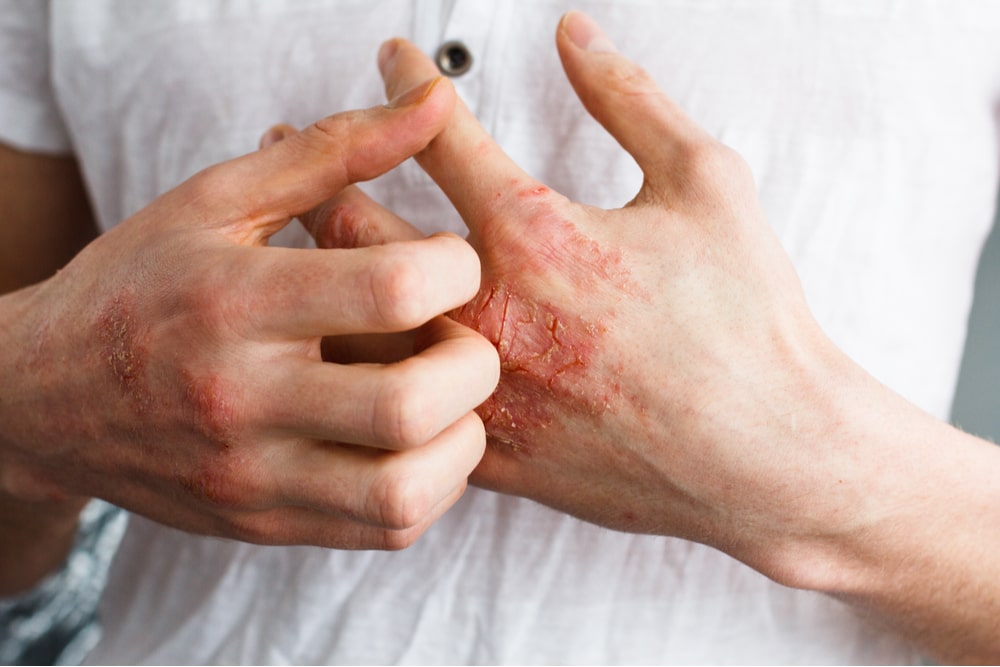Skin problems bring a lot of psychological, social and, and physical problems. Illnesses dealt unto the skin may be caused by various factors such as chemicals, genes, fungi, pollution, and many others. SKin problems have drastic effects on your quality of life if untreated. Today this article will talk about eczema which is a condition that affects 15-20% of children and 1-3% adults all over the world.
Sit tight! because we will cover what eczema is, its causes, and how to treat or prevent it.

What is Eczema (Atopic Dermatitis)
Eczema or atopic dermatitis is a condition that commonly happens to infants and children. A person suffering from eczema frequently suffers from skin inflammation, itching, and skin blisters, This skin condition removes the ability of the skin to hold moisture and destroys the skin barrier. Eczema is a contagious skin disease that is transferrable from one person to another through physical contact.
According to a publication authored by Dr. Tony Woolfson (2008), Atopic dermatitis (eczema) may be classified into two- endogenous and exogenous. Endogenous eczema is caused by the inherent condition of the skin to develop dermatitis. On the other hand, exogenous eczema is caused by external factors such as dust, allergens, etc.
Forms of endogenous eczema are:
- Atopic Eczema
- Asteatotic Eczema
- Seborrhoeic Dermatitis
- Discoid Eczema
- Stasis Dermatitis
- Endogenous Vesicular Hand and Foot Eczema
Forms of exogenous eczema are:
- Irritant Contact Dermatitis
- Allergic Contact Dermatitis
- Photo Contact Dermatitis
- Dermaptophytide (Id reaction)
How To Know If You Have Eczema?
Determining if you're suffering from eczema is easy because it always shows observable symptoms. Symptoms of eczema may show in various parts of the body such as the hands and feet. Some common symptoms are:
- Red small oozing blisters are the symptoms in the acute stage
- In the chronic stage, a person may suffer from dry thick darkened skin
- In infants, blisters and inflammation will appear in the face and extensor surfaces of the body.
- Hyperpigmentation (untreated chronic stages)
- Inflammation and blisters will show on the folds of the skin, legs, neck, and face (for children and adults)
If you or someone you know have all the symptoms listed here, it's best that you seek the aid of a professional dermatologist.
Treating and Preventing Eczema
Preventing eczema is possible through proper hygiene. This is especially true for exogenous eczema which is mainly caused by allergens, dirt, ultra-violet light, etc. When doing work which involves repeated wetting of the hands or contact with liquid chemicals, experts advise that you wear gloves. Protecting yourself against substances that may irritate your skin and avoiding foods that may cause you allergy will also work.
Eczema is caused by various triggers. Knowing what these triggers are will be very beneficial in treating and preventing eczema. Triggers include sleep deprivation, detergents, and soaps using strong formulas, poor sleeping habits, and many others.
Doctors may also advise that you use drugs if you're suffering from severe forms of eczema. Medical practitioners recommend the following drugs for treatment.
- topical corticosteroids
- topical calcineurin inhibitors
- Immunosuppressants
- sedating type antihistamines
- phototherapy
- biologic therapy
- bleach baths
To end, it is important that you know what eczema is, what causes it, and what are its treatments. Management and prevention of eczema will be possible if you're familiar with it. This skin condition when left unattended not only affects your physical well being but also your quality life. There are various studies that link eczema with depression and suicide. Treat eczema now and live confidently!
